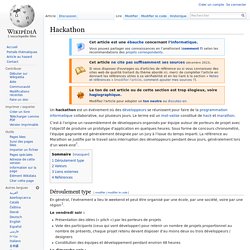

How agile should your startup be? By Danny Boice On December 31, 2012 Speed is key to the software development cycle.

Releases must come early and often, and the focus must be on high-priority development tasks. Features and bug fixes are especially important when budgets are constrained. Development in a startup is nothing more then a race to hit your hockey stick-shaped growth curve before the cash runs dry. So the question arises — what is the best software development methodology to follow for startups? There are basically three primary categories when it comes to software development methodologies: Waterfall, Agile and what I call “Developer Rambo.” Some may argue that there’s a fourth called RUP. Waterfall – Waterfall methodologies define requirements (in great detail) up front and then attempt to use those requirements to lock in on a set estimate of time and money to develop them, where progress flows down sequentially through the development phases (hence the name).
Which way to go? The startup solution. Hackathon. Un article de Wikipédia, l'encyclopédie libre.

C’est à l'origine un rassemblement de développeurs organisés par équipe autour de porteurs de projet avec l’objectif de produire un prototype d’application en quelques heures. Sous forme de concours chronométré, l’équipe gagnante est généralement désignée par un jury à l’issue du temps imparti. La référence au Marathon se justifie par le travail sans interruption des développeurs pendant deux jours, généralement lors d'un week-end[1]. Déroulement type[modifier | modifier le code] En général, l’événement a lieu le weekend et peut être organisé par une école, par une société, voire par une région[2]. Le vendredi soir : Le dimanche soir : Démonstration des prototypes devant un jury de spécialistesRemise des prix Aucune règle établie ne régit ce type d’événement.
Choix des projets par ceux qui réalisent,délai de réalisation très court,obligation de produire un prototype qui fonctionne. Valeurs[modifier | modifier le code] The Power of Questions - Noah Kagan. Ever wonder how to ask questions to get what you want?

If you ask the right questions you’ll get better answers. For example, How’s your day? What response do you generally get from that question? “Fine” “Good” “Ok” Now, what if I asked you: What did you have for lunch? See, a bit different. The person will tell you about their salad and then how the waiter was super nice. The point I’ve realized lately is that just by tweaking my questions I can get so much better responses. Think of it like your next meal, which question is easier to answer: What do you want to eat?
Of course the second one is easier. People are already going through 1000s of decisions everyday. Fight against Software Complexity. Why does software in the industry suck so much? Having worked at couple of startups and big companies as well, I can quite honestly say that of all the projects/repos that I had worked on, there was but one that didn’t suck. The one that didn’t suck, was I’m sure in no small part due to the fact that it was written by just one person, the CTO of the company, and since it was a license-based SDK, there was a vested interest in keeping things organized. Open source software projects, when compared with industry projects, are way easier to understand and in much better shape.
Why is that? It’s my belief that there are a multitude of organizational factors, that come into play, that will connive to make your company’s project complexity shoot through the roof, if you ‘meh’ the fight against complexity. Fight against complexity begins from the top-down The CTO of your software company, is probably the most important hire you can make. Hiring process Team size Choice of language Development speed. Iterations: Collective Wisdom. Editor’s Note: Semil Shah is an EIR with Javelin Venture Partners and has been a contributor to TechCrunch since January 2011.

You can follow him on Twitter at @semil. Recently, while traveling, I came across a “traditional print business magazine” and read it on the plane. It had nothing to do with startups, so it felt novel. There was one segment in the magazine where the editors solicited a few business leaders to share the single most important advice they’ve ever received and one that they still remember today, and I found it to be unexpectedly powerful. So, I decided to try it on people that I look up to in the startup world, and below is what they wrote. Josh Felser, two-time entrepreneur, currently a co-founder of Freestyle VC: “Even if it takes you weeks, return every legitimate email or call you receive, even if the response is short, because it reminds you where you came from,’” says Felser.